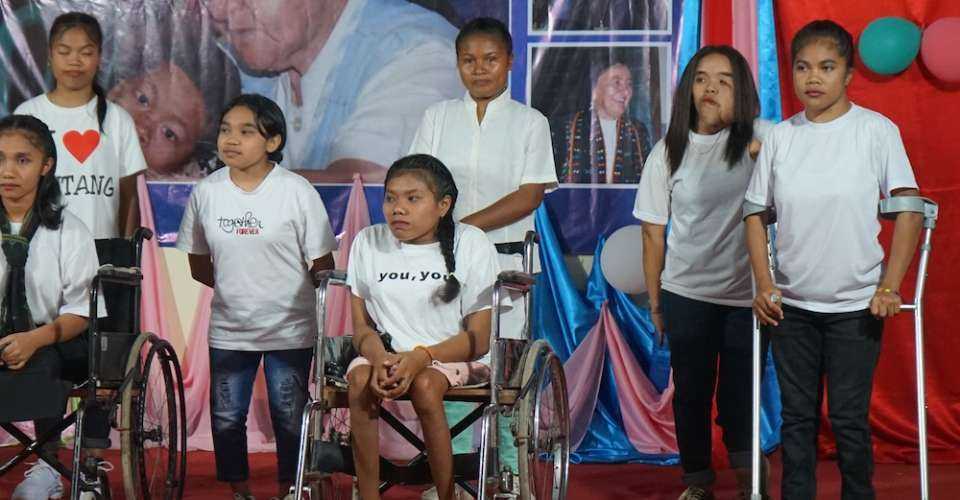
Children are seen at St. Damian Cancar Rehabilitation Center in Labuan Bajo, Flores of Indonesia on June 23. (Photo supplied)
A Church-run leprosy rehabilitation center in Indonesia’s Catholic-majority Flores Island has paid tributes to a German nun who pioneered leprosy treatment.
An art exhibition has been organized from June 23-27 at St. Damian Cancer Rehabilitation Center in Labuan Bajo in memory of Sister Virgula Maria Schmitt of the Congregation of the Sisters of the Mission of the Servants of the Holy Spirit.
Schmitt founded the center in 2006 to offer treatment and rehabilitation to leprosy patients in the area.
The nun arrived in Flores in 1965 and a year later founded St. Michael Hospital and St. Damian Rehabilitation Center for Lepers and Persons with Disabilities.
The center in Labuan Bajo currently offers support to 100 inmates.
The nun was based in Flores for 49 years. She passed away in Steyl, Netherlands, on June 27, 2022.
The center’s chairperson Sister Franselin Sabu said the nun declared a crusade against leprosy and so "the local people have known Virgula as an apostle for the marginalized."
"Since Sister Virgula died, we have set the date of her death, namely June 27, as a day of celebration to remember her traces of love and struggle," she said.
The nun added that the order decided to commemorate her death anniversary with seminars and programs.
This year’s exhibition and art performance also seek to raise funds for the center by selling products to visitors such as bamboo and rattan furniture products, frames, rosaries, decorative lamps and other craftworks.
Also slated for sales are organic soap products and special herbal oils for wound healing, all of which are made from plants, the nun said, adding that funding has been depleting in recent years.
“We cannot be beggars. In the past, we lived off of many donors, but at least with what Sister Virgula has taught us, we can be donors for other people," she said.
“Anyone and whatever they are, whether they are disabled or have special needs, must be able to be independent to continue living in society,” she added.
"With this exhibition, we hope to get the funds we need to support our daily needs,” she asserted.
The hospital and leprosy centers founded by the German nun are among the first modern health facilities in Flores.
She later founded another center for people with disabilities in 2006. She retired in 2014.
The German nun also ran a center for children abandoned by parents.
Yosep Min Palem, coordinator of the exhibition and art performance, said that the various products sold were an effort to embody Virgula's commitment that "leprosy and disabled patients should be trained in certain skills according to their interests and abilities."
"By working and producing something, they feel they are useful," he said.
He said their work used to be hung on the wall and they were proud when visitors to the rehabilitation center bought it.
"They are proud of themselves, so their self-esteem is raised and they feel their dignity as human beings. For Sister Virgula, this is a kind of therapy, healing their inner wounds, because leprosy and the disabled were previously considered a disgrace," he said.
Apart from the exhibition of works, he said, for several days, this event involved people with disabilities from schools in Labuan Bajo
"By appearing in front of other people, hosting events, they feel that they matter and can make others happy," added Palem.
According to Indonesia’s Ministry of Health, leprosy is still a major public health issue in the country as it is the third nation after India and Brazil with the highest number of leprosy patients.
In 2022, the number of leprosy patients was approximately 13,487, the ministry said, adding that many cases remain undetected and unreported.
The government says seven out of 38 Indonesian provinces, including Christian-majority East Nusa Tenggara (which covers Flores Island), are risky zones for leprosy as those provinces are unable to meet the national elimination target of 1 case in 10,000 population.


